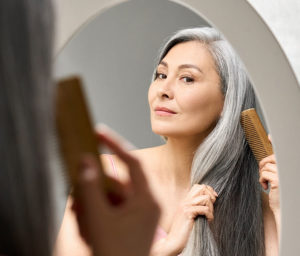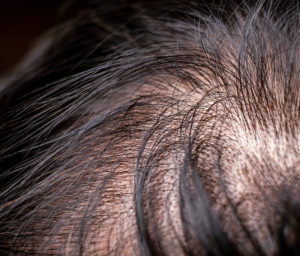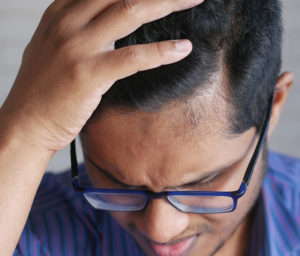Children Hair Loss Resources
Children Hair Loss and Thinning Hair can be caused by a number of conditions.
In children, the most common causes include fungal or bacterial infections, telogen effluvium (stress-related hair loss), and traction alopecia. Treatments for cancer often cause sever hair loss. Find some answers below about hair loss and what we can do to help.
Learn About Our Hairloss Services
What You Need to Know About Hair Loss & Cancer
Some of the most difficult side effects of cancer treatments might not cause physical pain. For some cancer patients, hair loss may be one of the most distressing side effects of cancer treatment.
Hair loss, or alopecia, may make you feel vulnerable, self-conscious and exposed as a “cancer patient.” It is also a visible sign that your life has changed, which may trigger feelings of depression. You might be presented questions from others that you aren’t ready to deal with yet.
In most cases it is not the cancer itself causing the hair loss, but the treatments like chemotherapy or radiation. Hair usually begins falling out two to four weeks after you start treatment. It could fall out very quickly in clumps or gradually. You’ll likely notice accumulations of loose hair on your pillow, in your hairbrush or comb, or in your sink or shower drain. Hair loss may continue throughout treatment and up to a few weeks afterward.
Most hair loss is temporary, and hair will grow back after the cancer treatment ends. Hair generally grows back within three months after chemotherapy ends and three to six months after radiation ends. Sometimes hair re-growth begins even before therapy is complete. And, it’s common for hair to grow back a slightly different color and texture at first.
Title
Lorem ipsum dolor sit amet, consectetur adipiscing elit, sed do eiusmod tempor incididunt ut labore et dolore magna aliqua. Ut enim ad minim veniam, quis nostrud exercitation ullamco laboris nisi ut aliquip ex ea commodo consequat. Duis aute irure dolor in reprehenderit in voluptate velit esse cillum dolore eu fugiat nulla pariatur. Excepteur sint occaecat cupidatat non proident, sunt in culpa qui officia deserunt mollit anim id est laborum.
Lorem ipsum dolor sit amet, consectetur adipiscing elit, sed do eiusmod tempor incididunt ut labore et dolore magna aliqua. Ut enim ad minim veniam, quis nostrud exercitation ullamco laboris nisi ut aliquip ex ea commodo consequat. Duis aute irure dolor in reprehenderit in voluptate velit esse cillum dolore eu fugiat nulla pariatur. Excepteur sint occaecat cupidatat non proident, sunt in culpa qui officia deserunt mollit anim id est laborum.
Lorem ipsum dolor sit amet, consectetur adipiscing elit, sed do eiusmod tempor incididunt ut labore et dolore magna aliqua. Ut enim ad minim veniam, quis nostrud exercitation ullamco laboris nisi ut aliquip ex ea commodo consequat. Duis aute irure dolor in reprehenderit in voluptate velit esse cillum dolore eu fugiat nulla pariatur. Excepteur sint occaecat cupidatat non proident, sunt in culpa qui officia deserunt mollit anim id est laborum.
What You Need to Know About Hair Loss & Diet

Hair follicles are highly active and sensitive. In fact, hair follicle cells are among the most rapidly dividing cells in your body, so it’s no surprise that nutrient deficiencies can negatively affect hair growth.
An iron deficiency is the most common nutrient deficiency in the world and can cause hair loss. This condition is related to a type of hair loss known as telogen effluvium (TE), which is characterized by a disruption in the normal hair growth cycle. This leads to excessive hair shedding and loss. Some studies have shown that people with hair loss tend to have lower iron levels in their blood and hair compared with people who don’t have hair loss.
Vitamin D also plays an important role in hair growth and the health of hair follicles. Research has shown that vitamin D levels are lower in people with hair loss conditions, including female pattern hair loss and an autoimmune skin disease called alopecia areata. Taking vitamin D supplements is believed to promote hair regrowth in some people with this type of hair loss.
Zinc is a mineral that plays important roles in immune function, protein synthesis, cellular division, and more. It’s necessary for hair follicle function and helps protect against hair follicle shrinkage and slowed growth, plus it helps promote hair follicle recovery.
A deficiency of zinc can cause hair loss, and people with certain hair loss conditions tend to have lower zinc levels than people without hair loss. Those conditions include:
- alopecia areata
- male pattern hair loss
- female pattern hair loss
- telogen effluvium (TE)
Deficiencies in the following nutrients can also be associated with hair loss:
- copper
- biotin
- vitamin B12
- folate
- riboflavin
In summary, a deficiency in one or more micronutrients may lead to hair loss. If you’re experiencing hair loss, you may want to be tested for deficiencies in iron, vitamin D, zinc, B vitamins, and copper.
What You Need to Know About Alopecia

Alopecia can be divided into disorders in which the hair follicle is normal, but the cycling of hair growth is abnormal and disorders in which the hair follicle is damaged. Androgenetic alopecia is the most common cause of hair loss in women. A hereditary condition, it is marked by the thinning of hair over the top and sides on the head. In men it shows as baldness in receding hairlines. Other disorders include:
- Alopecia areata which results in patchy hair loss presenting as a single patch, multiple confluent patches up to complete baldness.
- Telogen effluvium which is diffuse hair loss often caused by stress.
- Cicatricial alopecia is caused by a condition that damages the scalp and hair follicles like infections, autoimmune diseases or even burns.
- Traumatic alopecia may be caused by cosmetic practices like curling irons, brushes with square tips, over-braiding or trichotillomania (self hair plucking).
What You Need to Know About Hair Loss & Stress

Science supports the notion that significant emotional stress may be linked to one type of hair loss: telogen effluvium. There are approximately 100,000 hair follicles on the adult scalp. Each follicle cycles between growth and rest. Most of the hair follicles are in the anagen (growth) phase at any given time. When the hair follicle transitions to telogen, or the resting phase, the hair is shed. Hair loss occurs when there is an episode of telogen effluvium. This is when a trigger causes a sudden, abnormal shift of hairs into the telogen phase all at once. One trigger for this sudden shift is significant emotional stress.
What qualifies as significant emotional stress? A major, negative life event (i.e., loss of a loved one or divorce). While a single bad day at work shouldn’t meet this threshold, severe and prolonged stress secondary to an illness, condition or the pandemic, for instance, could certainly qualify.
Hair loss associated with telogen effluvium is abrupt, diffuse, and temporary. Telogen effluvium is characterized by the abrupt onset of hair loss. It usually begins about three months after the inciting event. Once hair follicles prematurely enter the telogen phase, it takes about three months for the cycle to complete and for the hair to shed.
The pattern of hair loss associated with telegen effluvium is diffuse. Individuals experiencing telegen effluvium may notice their ponytail is thinner, or there are more hairs in the shower.
The hair loss from this condition is usually temporary. Hair should return to its pre-effluvium density, although it may be slow. It can take months for the shedding to stop and then months to years for the lost hair to grow back at approximately 1/2 inch per month.
In some circumstances, hair does not fully return to full density.
What You Need to Know About Hair Loss Post COVID Exposure

Months after recovering from COVID-19, many people find that their hair is falling out in large clumps.
With COVID, we’ve learned to expect the unexpected. The hair loss that many people develop, however, may actually be expected. Because temporary hair loss is normal after a fever or illness
Fever has been a common symptom of COVID-19. So, a few months after having a high fever or recovering from an illness like COVID, many people notice hair loss.
While many people think of this as hair loss, it’s actually hair shedding. The medical name for this type of hair shedding is telogen effluvium. It happens when more individual hairs than normal enter the shedding (telogen) phase of the hair growth lifecycle at the same time. A fever or illness can force more hairs into the shedding phase.
Many people who’ve been ill with COVID see noticeable hair shedding two to three months after having the illness. Handfuls of hair can come out when showering or brushing the hair. The condition of shedding may last for six to nine months before it stops.
What You Need to Know About Hair Loss and Aging

Getting older is one of the most common causes of hair loss. Nearly everyone has some hair loss with aging as the rate of hair growth also slows. As we age, hormone levels change (consider menopause in women), and hair follicle size also diminishes, contributing to hair loss. In men, hair loss due to aging frequently begins at the temple and crown. In women, it is more widespread across the scalp, but not as noticeable.
Hair strands become smaller and have less pigment. So the thick, coarse hair of a young adult eventually becomes thin, fine, light-colored hair. Plus many hair follicles stop producing new hairs.
What You Need to Know About Hair Loss During Menopause

Hormonal fluctuations are responsible for hair loss during this time of life. Estrogen and progesterone keep hair in the growing phase, making it grow faster and stay on the head longer. When estrogen and progesterone levels decline, hair growth slows down and hair loss becomes more pronounced. Also, the body produces more androgens during perimenopause and menopause in response to the loss of estrogen and progesterone. Androgens shrink hair follicles, which causes hair loss on the head.
Female hair loss is a common condition, especially in the years surrounding menopause. It is estimated that over 50% of women experience hair loss. Age, diet, ethnicity, and genetic factors all influence your chances of experiencing hair loss throughout your life, including during and after menopause.
Because we lose hair every day regardless of age or health, it can be difficult to tell when the actual hair loss begins. But eventually, the signs are more noticeable. You may notice more hair than usual fall out on a daily basis — in your hairbrush, in the shower, or pillow. Or you may feel that your ponytail has become thinner. The part at the top of your head may get wider or become more wider as the hair thins. You may also see more breakage than usual.
While hair loss due to menopause will not reverse on its own, there are treatments that can help. From hormone replacement therapy to Minoxidil, Antiandrogens and Red Light Therapy, we can access your hair loss and recommend treatments for you.
 Unfortunately, yes. Lupus causes widespread inflammation that usually involves your skin — particularly on your face and scalp. Lupus can cause the hair on your scalp to gradually thin out, although a few people lose clumps of hair. Loss of eyebrow, eyelash, beard and body hair also is possible.
Unfortunately, yes. Lupus causes widespread inflammation that usually involves your skin — particularly on your face and scalp. Lupus can cause the hair on your scalp to gradually thin out, although a few people lose clumps of hair. Loss of eyebrow, eyelash, beard and body hair also is possible.
In most cases, your hair will grow back when your lupus is treated. But some people with lupus develop round (discoid) lesions on the scalp. Because these discoid lesions scar your hair follicles, they do cause permanent hair loss.
Lupus can also cause the scalp hair along your hairline to become fragile and break off easily, leaving you with a ragged appearance known as lupus hair.
Hair loss may be an early sign of lupus, before the disease is diagnosed. But many other disorders can cause hair loss, so consult with your doctor if you notice unusual hair thinning or hair loss.
Original – https://www.mayoclinic.org/diseases-conditions/lupus/expert-answers/lupus/faq-20058400#:~:text=Unfortunately%2C%20yes.,body%20hair%20also%20is%20possible.
 Our experts assist women with medical-related hair loss. We offer high-quality wigs for cancer patients, medical wigs for chemotherapy, alopecia or Lupus.
Our experts assist women with medical-related hair loss. We offer high-quality wigs for cancer patients, medical wigs for chemotherapy, alopecia or Lupus.
Let us help you look and feel like yourself again with one of our custom wigs. Our wigs will help you regain your self-esteem and self-confidence.
 Many men and women find that nutrient deficiencies can cause hair loss. Eating a healthy diet can help to alleviate thinning hair. Often, these deficiencies can be monitored by your physician and addressed through diet changes, along with the use of appropriate supplements.
Many men and women find that nutrient deficiencies can cause hair loss. Eating a healthy diet can help to alleviate thinning hair. Often, these deficiencies can be monitored by your physician and addressed through diet changes, along with the use of appropriate supplements.
Telogen Effluvium hair loss happens when the hair begins to stop growing prematurely. The strands of the hair fail to grow as they should, resulting in very fine, straggly hair along with areas of thinning.
Telogen Effluvium is caused by various factors such as stress, trauma, pregnancy, rapid weight gain or loss, medicines, and hormonal changes. Once the cause of this hair loss has been found and treated, the hair loss can be reversed, and normal hair regrowth and hair recovery will occur.
Trichotillomania hair loss can also occur due to external factors such as hair spinning and hair-pulling. These activities can damage the hair to the degree that it fails to regrow.
We offer a private and professional environment with one-on-one service to educate and assist our clients with identifying the best hair loss solutions to help them look and feel like themselves again.
 A man or woman can start losing their hair in patches or through thinning or shedding. It happens for various reasons, and some instances of hair loss are harmless.
A man or woman can start losing their hair in patches or through thinning or shedding. It happens for various reasons, and some instances of hair loss are harmless.
Some hair loss is due to underlying health conditions like medical hair loss, such as chemotherapy treatments, lupus, alopecia areata, a dysfunctional thyroid or trichotillomania.
An overwhelming majority of women suffer from Androgenic Hair Loss or Androgenic Alopecia (AGA), also known in women as Female Pattern Hair Loss. It’s caused by androgens in these genetically susceptible women. Their Thinning Hair starts between ages 12 and 40 years old.
The Total Image Hair Restoration Center team is committed to helping women and men with hair loss.
We provide top-quality human hair wigs, synthetic hair wigs, lightweight frontals, closures, toppers, weaves, hair extensions, and hairpieces that look like natural hair and are easy to take care of. We are a proud member of the American Hair Loss Council.
Once you input your purchase price, you’ll be provided with the options you have for down payment. It is due when the merchant confirms they will need the funds in order to move forward with your services. Remember to bring your bank issued debit card when you are ready for checkout.
 Is it part of “natural” hair loss? We are all trying to figure out why we are experiencing hair loss when busy at work or shuffling the kids all over the city. What do I do about my hair loss? Is my natural hair loss normal? Do most women experience hair loss?
Is it part of “natural” hair loss? We are all trying to figure out why we are experiencing hair loss when busy at work or shuffling the kids all over the city. What do I do about my hair loss? Is my natural hair loss normal? Do most women experience hair loss?
Women can start losing their hair in patches or through thinning or shedding at any age. It happens for a variety of reasons. Although some instances of women’s hair loss are harmless, others are due to underlying conditions like Medical hair loss, Cancer hair loss, Chemotherapy hair loss, Lupus, Alopecia Areata, Thyroid hair loss or even due to Trichotillomania.
Hormonal changes also play a role in hair loss. Hormonal changes, such as pregnancy, menopause or stress, will cause hair loss. It is time to take control of your hair loss and learn about the Center’s natural-looking options that will help you look and feel like yourself again.
A man or woman can start losing their hair in patches or through thinning or shedding. It happens for various reasons, and some instances of hair loss are harmless. Some hair loss is due to underlying health conditions like medical hair loss, such as chemotherapy treatments, lupus, alopecia, areata, a dysfunctional thyroid or trichotillomania.
The Total Image Wigs & Hair Restoration Center team is committed to helping women and men with hair loss. We provide top-quality human hair wigs, synthetic hair wigs, lightweight frontals, closures, toppers, weaves, hair extensions, and hair pieces that look like natural hair and are easy to take care of. The Center is a member of the American Hair Loss Council.
 Hair loss can be emotional, socially, and psychologically devastating. Women experience hair loss for various reasons, including alopecia, burns, or even chemotherapy. Our experts will design a natural-looking wig that will perfectly match the natural hair color, length, style and help you look and feel like yourself again.
Hair loss can be emotional, socially, and psychologically devastating. Women experience hair loss for various reasons, including alopecia, burns, or even chemotherapy. Our experts will design a natural-looking wig that will perfectly match the natural hair color, length, style and help you look and feel like yourself again.


